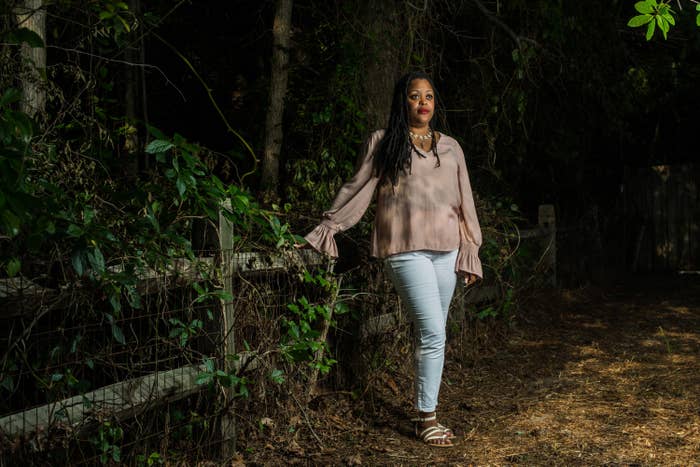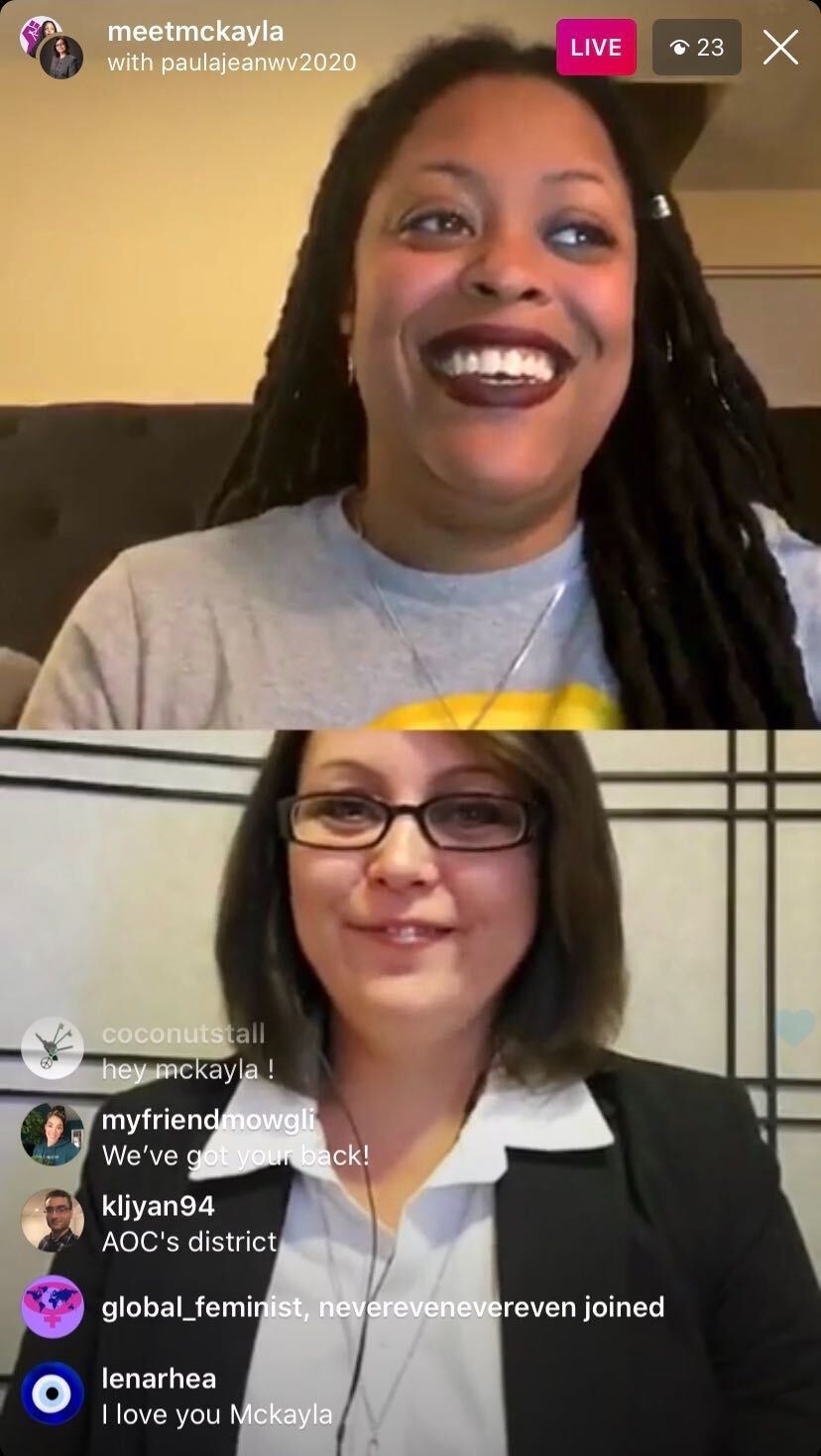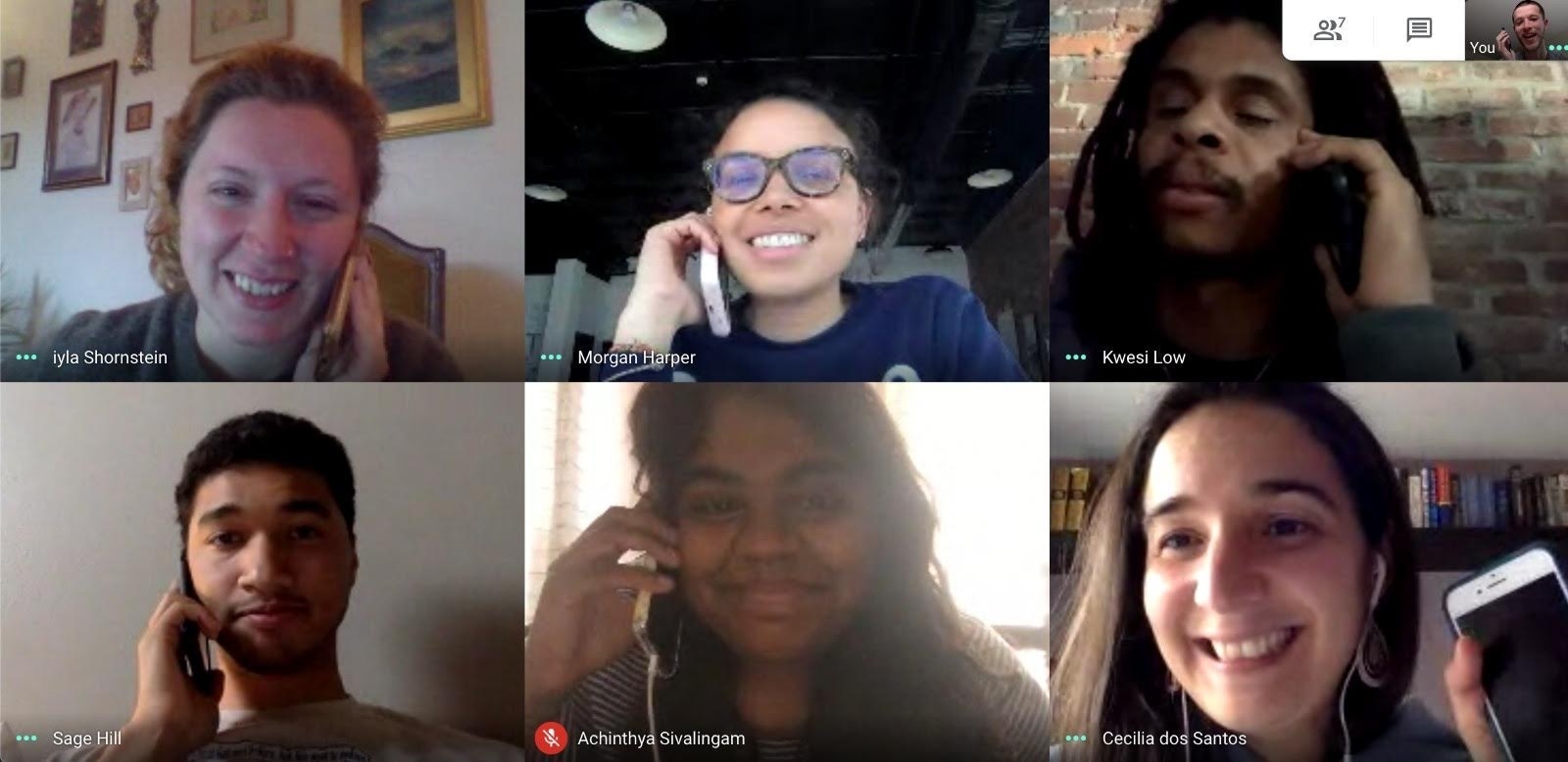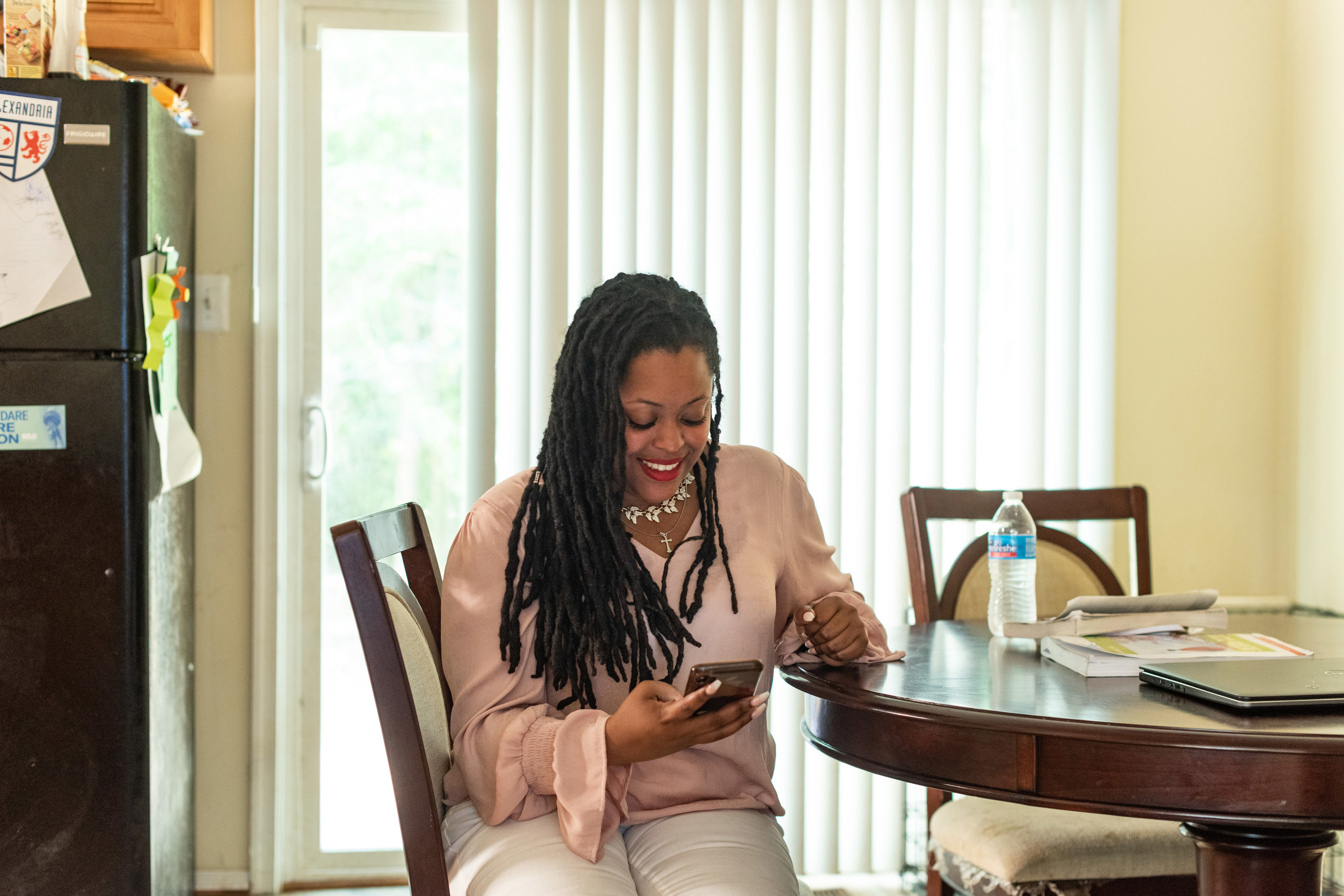
The journalists at BuzzFeed News are proud to bring you trustworthy and relevant reporting about the coronavirus. To help keep this news free, become a member and sign up for our newsletter, Outbreak Today.
WASHINGTON — On an average day, Mckayla Wilkes starts early. She’s currently homeschooling her two kids because of the coronavirus outbreak, so the mornings are filled with working with her young daughter on recognizing the alphabet and juggling her son’s math, science, social studies, and reading assignments.
After two to three hours of schoolwork, Wilkes, 29, who’s running for Congress in Maryland, starts four to five hours of “call time” to fundraise for her campaign. After that, it’s back to homeschooling.
“I was always a multitasker, but this is a whole ‘nother level of multitasking,” she said during a recent interview with BuzzFeed News. “It's kind of like doing everything all at once — like, I'll be doing call time, but then, you know, my 5-year-old will come in and want a sandwich.”
Wilkes is a progressive running in the Democratic primary against House Majority Leader Steny Hoyer, the second-most powerful Democrat in the House. Originally, the election was scheduled for April 28, but due to the coronavirus, voting is now scheduled for June 2.
For months, Wilkes and her team knocked on thousands of doors in the district, hoping to re-create the success of Rep. Alexandria Ocasio-Cortez, who took down a powerful House Democrat two years ago.

But now Wilkes and her team are forced to work from home, and the organizing strategy they relied on is out the window. She’s not alone. Other progressive primary challengers across the country who have relied on door-knocking and in-person events to overcome well-funded incumbents say they have had to retool their campaign strategies, focus on vote-by-mail efforts, and make additional fundraising calls to keep their campaigns running as the pandemic rages globally.
“Campaigning during COVID is campaigning how all grassroots campaigns start out,” Wilkes said. “Because in the beginning, you don't have money, you have to use social media, you have to do things virtually, you have to kind of, you know, build your base, so that you can get money to knock on doors. And so we've reverted back to how we began the campaign.”
To connect with voters during this time, Wilkes and her campaign manager, Dash Yeatts-Lonske, said, campaign staff and volunteers are phone-banking daily. Wilkes also holds virtual events on Facebook Live, something other progressive challengers, including Morgan Harper, who’s running against incumbent Democratic Rep. Joyce Beatty in Ohio, said they’ve had success with.
“When you’re a grassroots campaign, the whole name of the game is bringing people together physically to organize,” Harper told BuzzFeed News. “But we can do this digitally, and that has been an adjustment that we've been able to make really well, and our team has been able to make, by doing conference calls and all that — like a lot of people are doing — and I am in many ways more optimistic than ever.”
“The message of our campaign — that we are all as vulnerable as the most vulnerable among us — has been crystallized by this crisis,” Harper said.
"When you’re a grassroots campaign, the whole name of the game is bringing people together physically to organize."
Originally, Harper’s election was scheduled for March 17, but last month, it was moved to Tuesday.
“We didn't do a ton of Facebook Live before this extended campaign period, and we’ve certainly stepped those up given that we can't hold our weekly in-person community rallies like we had been doing,” Harper said during a recent interview with BuzzFeed News.
When the date was first moved, Harper said there wasn’t a lot of clarity. The campaign worked to connect with community organizations like Meals on Wheels to deliver food to people in need, and once the new election plan was clear, the team prepared to help people successfully vote by mail.
“That's a huge transition, because most people don't vote by mail and the absentee process here is complicated,” she said. “A lot of people we knew were going to be navigating that for the first time, and it's confusing, and they also have a lot of other things going on, so we were very concerned about disenfranchisement.”

Yeatts-Lonske said a lot of the Wilkes campaign’s phone-banking efforts have also been focused on helping people vote by mail.
Holyoke, Massachusetts, Mayor Alex Morse — a young, openly gay progressive who’s challenging incumbent Democratic Rep. Richard Neal — said Facebook Live events have been his most effective tool for communicating with many voters at once. Usually, several hundred people will join when the event is live, and then thousands of people will view the archived video in the days and weeks after.
"We had about eight quote-unquote normal months of campaigning."
“We had about eight quote-unquote normal months of campaigning … we were crisscrossing the district every single day, multiple times a day doing, you know, town halls and meet-and-greets and meeting with Democratic city and town committees, and going to cafés and just meeting people where they're at and talking about our message and converting people that may have been skeptical,” Morse said during a recent interview with BuzzFeed News.
The campaign was really hitting its stride, Morse said, right as the coronavirus outbreak forced everyone inside, out of cafés and town halls and other traditional campaign meeting places. The Massachusetts congressional primaries are still months away, however, and Morse hopes that before their Sept. 1 Election Day, the campaign will be able to get back outside and into the community.
But for now, he says, “We have to we have to operate under, you know, [the theory of] ‘Let's do everything we can given this pandemic and ... the constraints that we're under.’”
As part of that, Morse’s campaign has started doing community wellness phone-banking events. Campaign volunteers have been calling residents in the district to make sure they are connected with community programs should they need help during the outbreak, and just to check in.
“You know, ‘How are you doing? Are you holding up? Is there anything we can help connect you with?’” Morse said they are asking voters. Then, they talk about what Morse is doing as mayor of Holyoke, a town in the district, explain he’s running for Congress, and talk to people about their concerns.
“I think we've noticed that people appreciate just simple questions like ‘How are you doing?’” the mayor noted. Then, he said, “[They’re] having a conversation about the campaign and actually using that as an opportunity to identify support.”
Because everyone is stuck at home, Morse said, voters also seem to be picking up the phone more often and are more willing to talk at length. And candidates also said they believe the coronavirus outbreak has made voters more sympathetic to progressive ideas in general.
“The crisis has illuminated the already existing inequities in our community and in our district, and it's also illuminated the brokenness of our political system on all sides of the aisle in that there's a consistent failure to meet the moment,” Morse said. “Congressman Neal — and this is not an exaggeration — is the biggest obstacle to health care being a human right in the country. As long as he's chair of the Ways and Means Committee, we will not have Medicare for All. Health care will not be a human right.”
(In a statement to BuzzFeed News, Neal campaign spokesperson Kate Norton said, "After ending last quarter more than $1 million short of his campaign's stated fundraising goal, Alex is clearly desperate and willing to say whatever it takes to get any attention, no matter how outlandish.")
Morse says he feels it’s particularly relevant right now in his district, because of how dangerous the coronavirus can be for people with asthma — and Springfield, Massachusetts, the largest city in the district, is the asthma capital of the United States.
Wilkes said she’s noticed a similar sentiment in her own district.
“A lot of people [who] are going through this haven't been through this before, but for so many other people this is just another day to them,” Wilkes said. “Before COVID, we had people struggling to put food on the table, sending their kids to school and [hoping] that's how they're going to get their meals for that day. We already had people saying, ‘How am I going to go to the doctor? What if I get sick? I don't have health insurance.’”
More and more people are losing employer-sponsored health insurance, worried about their finances, and unsure how they’ll be able to feed their families, as 26.5 million people in the US have filed for unemployment, and others are seeing their hours cut or wages decreased.
“It is completely expedient to have someone that has progressive values in office on all levels of government, because this pandemic is not going to go away anytime soon,” Wilkes said she tells voters. “And it's like, who do you want fighting for you during this pandemic? Do you want someone who's not going to be bold, who's going to be pulled into corporate interests, or do you want to have someone that's going to fight for you?”
Progressive challengers have had mixed successes so far in 2020. Jessica Cisneros, the first candidate recruited and endorsed by Justice Democrats (one of the groups that helped Ocasio-Cortez) this cycle, lost to Rep. Henry Cuellar — one of the last anti-abortion Democrats in the House — earlier this spring. But Marie Newman, another Justice Democrats candidate, successfully toppled another anti-abortion Democrat, Rep. Dan Lipinski in Illinois, not long after.
And in addition to now having to deal with the coronavirus, progressive campaigns have also lost their most ideologically compatible presidential candidate in the Democratic primary in recent weeks. But, perhaps counterintuitively, Harper, Wilkes, and Morse all said that since Sen. Bernie Sanders exited the race, their campaigns have seen increased volunteers and fundraising numbers.
“We've just gotten like a huge burst of energy,” Wilkes said. “People were eager to come and volunteer with us. A lot of people were like, you know, basically saying that they're going to focus a lot more on down-ballot races. … It brought us a fundraising surge and then also a volunteer surge.”

Morse said there was “some despair” when both Sanders and Sen. Elizabeth Warren exited the race, but, he said, people seem to have been moved by the argument that it’s important to invest in building a Democratic bench.
“That message is resonating with voters with donors and supporters — that we need to invest in progressives — and you know with Biden, with the Biden presidency, it's going to be important that we have more progressive members of Congress holding the administration accountable,” he said.
Harper said she thinks Sanders’ exit helped people realize that “organizing has to be more than just one person.”
“These policies that Sen. Sanders has put on the radar for a lot of people really broaden the understanding of what types of steps could be taken at the federal level to support people being able to leave more stabilized and create more secure futures for all of us,” she said. “That’s something you can't just take away.”
If you're someone who is seeing the impact of the coronavirus firsthand, we’d like to hear from you. Reach out to us via one of our tip line channels.

